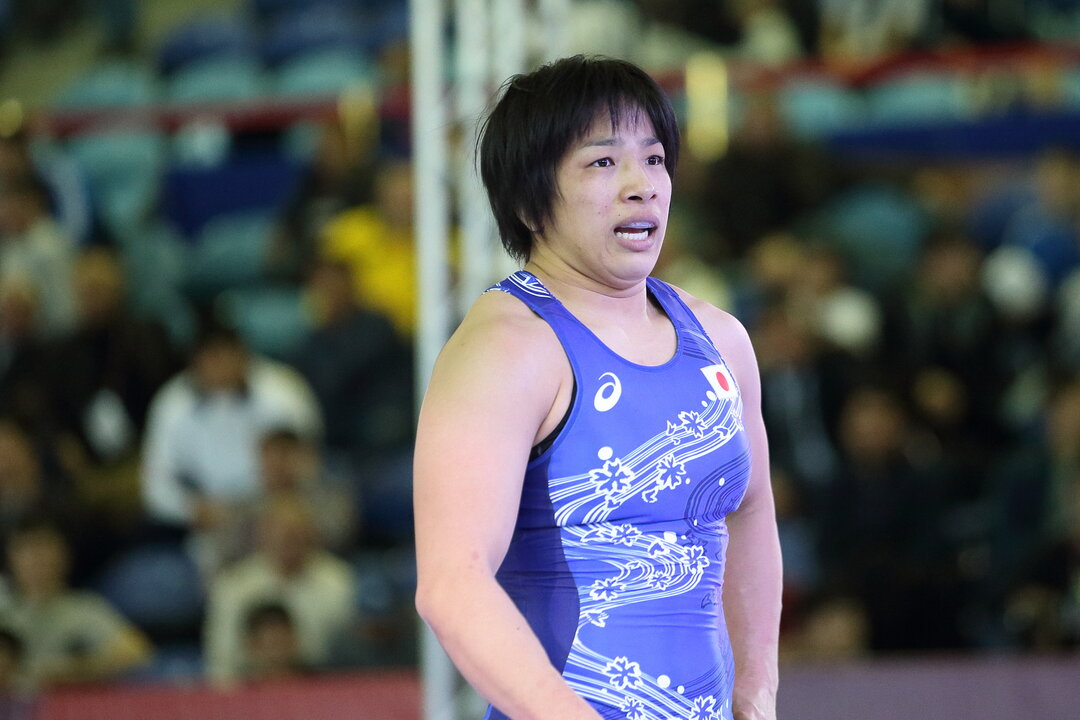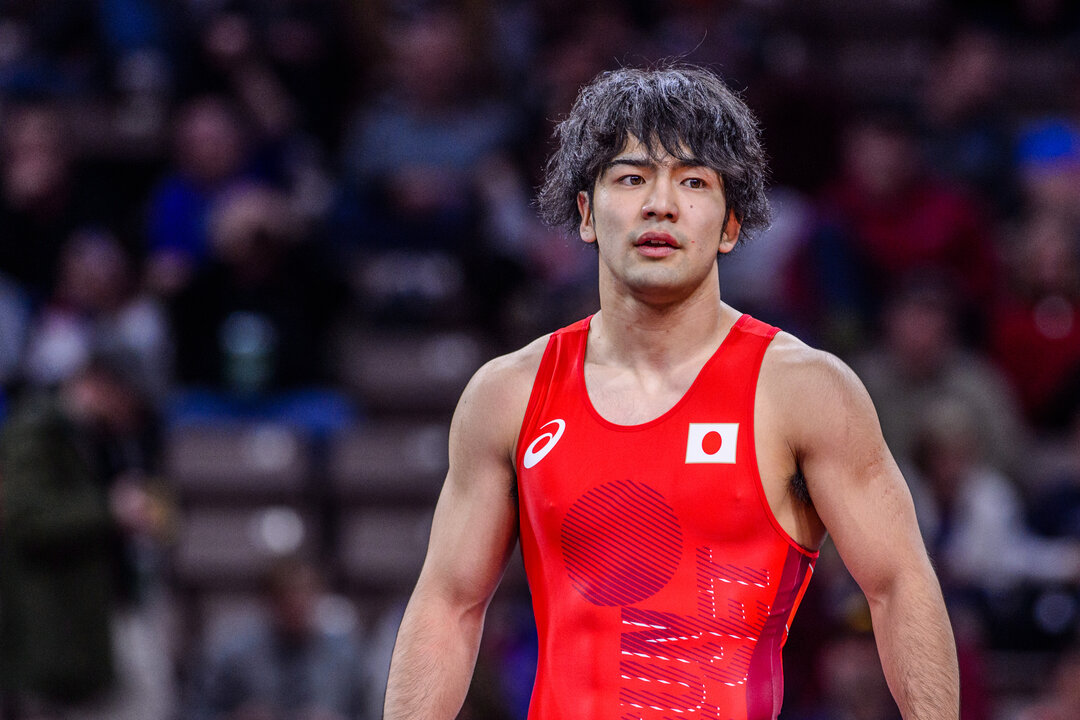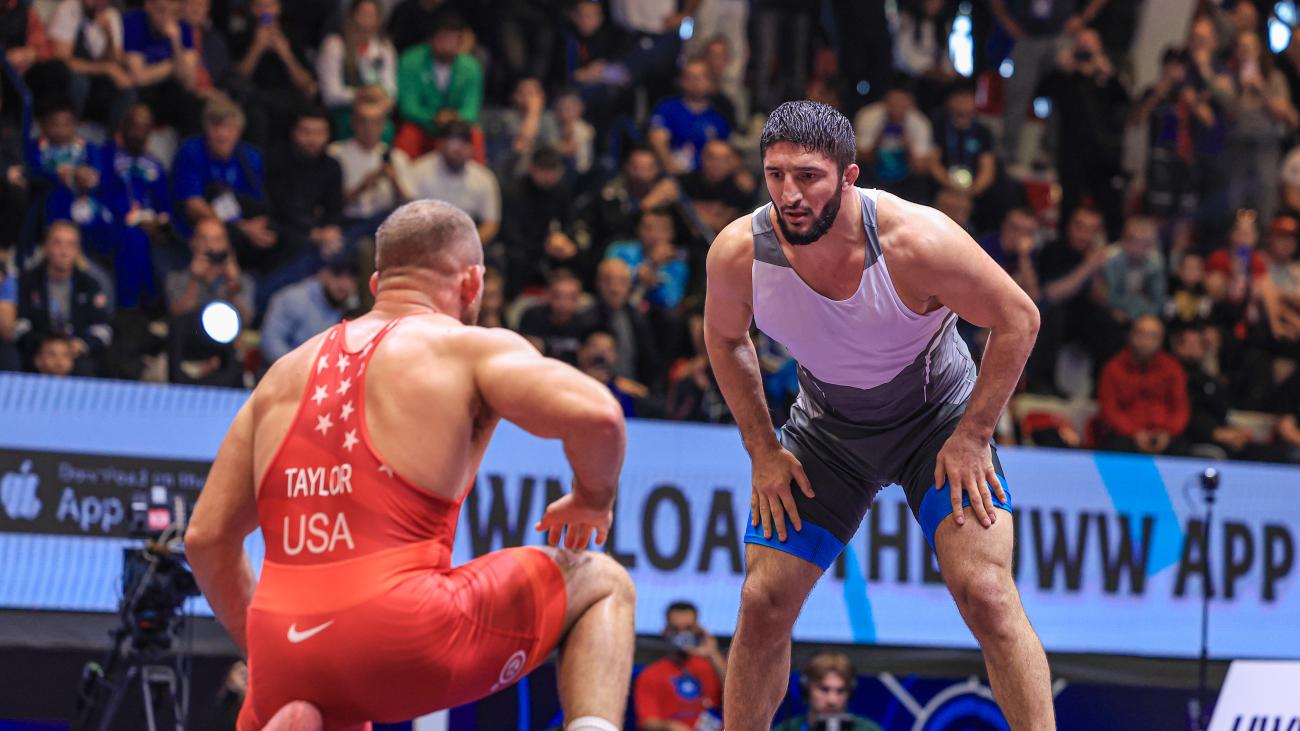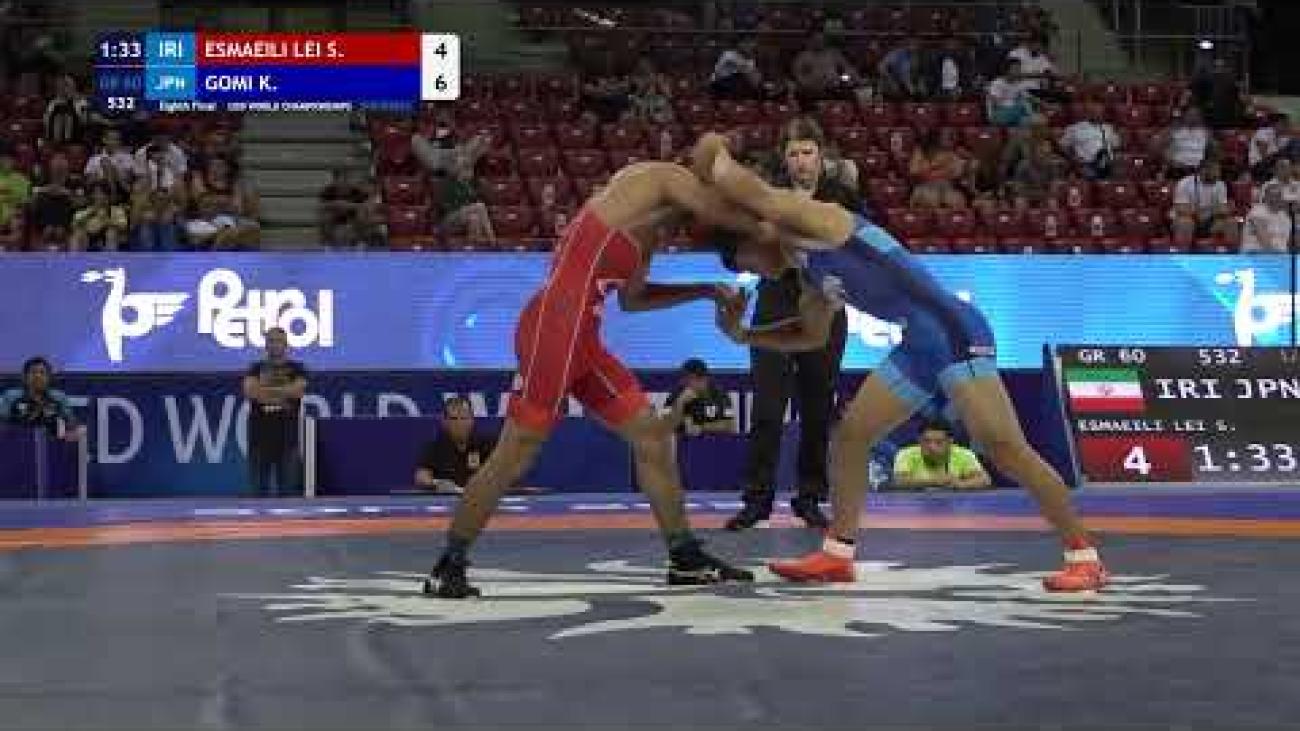TOKYO, Japan (June 16) - Emotions were running high when Rio WATARI stepped back onto the mat for a tournament, two years after beginning and eventually winning a grueling fight against cancer.
The tears of joy and relief flowed freely when she walked off as a champion.
Watari capped her remarkable recovery from Hodgkin lymphoma, winning the women’s 68kg title at the All-Japan Invitational Championships in Tokyo to earn a place on Japan’s team to the world championships in Budapest.
Watari added even more drama to the moment by scoring a decisive step-out point with :06 left in the final against Chiaki SEKI, giving her a 3-2 victory and her first title in the tournament, known as the Meiji Cup, since 2014.
Watari’s winning point came on her fourth tackle attempt. Her three previous ones were all stopped, and the only points scored by either wrestler had come on the activity clock, with Watari’s second giving her a 2-1 lead with :32 left.
But Seki, who had previously wrestled under her maiden name IIJIMA, went ahead on last-point criteria when her lone tackle attempt of the match forced out Watari to tie it at 2-2 with :24 remaining.
Watari, having come this far, wasn’t going to be denied, and she responded to the delight of the loud contingent of supporters from her sponsor, Aisin AW, in the Komazawa Gym stands.
“I went for it with the strong feeling that I would definitely win and go with the other champions from Shigakkan to the world championships,” Watari said, referring to her alma mater, powerhouse Shigakkan University, which will fill much of the women’s team to Budapest with current and alumni wrestlers.
Watari needed just two matches to win the gold. In her opening match---her first since the Rio 2016 Olympics—she scored a solid 7-0 victory over Shigakkan’s Mai HAYAKAWA to advance to the final.
“In the first match, even getting over my nervousness, my body was trembling, so much that I didn’t feel like myself,” the 26-year-old Watari said. “I couldn’t calm down and felt anxious. I felt like I wouldn’t be able to win the title if I go on like this.
“In the final, I believed in what I had done up that point and was determined to win. I was able to take up the challenge in a relaxed mood.”
 Rio WATARI, 68kg champion. (Photo by Sachiko Hotaka)
Rio WATARI, 68kg champion. (Photo by Sachiko Hotaka)
Prior to her illness, Watari had already made nationwide headlines when she qualified for Rio. What made her case so special was that, in her intense desire to win an Olympic medal, she went up two weight classes, from 63kg to 75kg. She reportedly gained 12 kgs by eating five meals a day.
Her lymphoma was diagnosed just before the Olympics, but she managed to compete anyway. She does not use the illness as an excuse for her disappointing one-point loss to Aline da Silva FERRIRA (BRA). After returning to Japan, her condition was made public and, as it worsened, she began chemotherapy and other treatment.
“At the Olympics, while I fought with the decision about whether or not to compete, I kept practicing and was able to participate,” Watari said. “After that, my life fighting the illness began. I was bedridden much of the time, and often felt dizzy while standing. With every passing day I wondered if I would ever be able to return to wrestling.”
From last September, she started walking, riding a bicycle and little by little getting the “body of a normal person.” After being limited to basic exercising, she returned to the wrestling room in January.
“If I take my condition before the Olympics as 100 percent, I’m still far away in terms of physical strength,” she said. “I still can’t go all out until the end of practice. I would put it at 50 percent.”
Watari made it directly onto the team to Budapest because world and Olympic gold medalist Sara DOSHO, the 68kg winner at the All-Japan Championships (called the Emperor’s Cup), suffered a shoulder injury at the Women’s World Cup in March that kept her out of the Meiji Cup.
The winners of the Emperor’s and Meiji Cups in each weight class, if different, will meet in a playoff on July 7 for berths on the team to Budapest, and Dosho will not be available for the playoff either.
For Watari, her remarkable comeback does not erase the sting of her defeat in Rio. During her post-match press conference, she broke down when asked about the support she received from her parents during her battle with cancer.
“I wasn’t able to win at the Olympics and bring back a medal to show them,” she said through tears, her way of saying that the best way she can repay them is to strike gold at the Tokyo 2020 Olympics.
“It’s not yet the Olympics, so this doesn’t erase what happened in Rio,” she said. “I have to think about how far I can go at 68kg, and with the Olympic qualifying coming up, what weight class is best for me. This victory and making the world team becomes a good step toward the Olympics.”
Still, having gone through a deadly disease makes her more appreciative of the time she spends on the mat and allows her to bear the rigors necessary to achieve success.
“Right now, I’m having fun everyday in wrestling,” she said.
 Shota TANOKURA secured his ticket to the world championships by winning the 55kg championship. (Photo by Sachiko Hotaka)
Shota TANOKURA secured his ticket to the world championships by winning the 55kg championship. (Photo by Sachiko Hotaka)
Asian champ Tanokura has eyes on world gold
In other action, Asian champion Shota TANOKURA put on his latest display of spectacular throws in storming to the Greco-Roman 55kg gold and securing his ticket to the world championships.
Tanokura followed up on his Emperor’s Cup triumph by posting two victories by technical fall before beating Shota OGAWA 7-0 in the final, gaining the bulk of his points with a front headlock throw.
It was Tanokura’s third Meiji Cup gold and first since 2015. He had retired after failing to make the Rio Olympics, with part of the reason being that he felt handicapped when the minimum weight class was raised to 59kg. He was soon overtaken by Olympic silver medalist Shinobu OTA and world champion Kenichiro FUMITA.
But the return of the 55kg weight class led to Tanokura’s return to the sport last year, although he continues to keep his job as a Tokyo high school physical education teacher.
His school obligations kept him from training as he would have preferred for the Meiji Cup, much to the chagrin of his coach.
“This tournament, after the Asian Championships [in Bishkek in February] and the final national camp, I honestly wasn’t able to train,” Tanokura said.
“Coach Shingo Matsumoto, a week before the tournament, said to me, ‘Dude, you’re not going to be able win like that.’ I was told I would have to go in with the mindset of a challenger, and that turned the switch on for me, even though it was a bit late.
Tanokura, a three-time Asian medalist, will get his first shot at a world medal, and has boosted his confidence by a second-place finish as the Dan Kolov-Nikola Petrov Tournament in Sofia in March.
“I competed once in Europe, and my impression is that Asian wrestlers are stronger than the Europeans in the lighter weights,” he said. “All that remains is to aim for the gold at the world championships.”
 Yukako KAWAI, 62kg gold medalist. (Photo by Sachiko Hotaka)
Yukako KAWAI, 62kg gold medalist. (Photo by Sachiko Hotaka)
Meanwhile, half of Japan’s top sister act all but secured her ticket to Budapest, as Yukako KAWAI captured the women’s 62kg title.
Kawai shed tears after her victory, but they were not of joy. She was dissatisfied by her performance in the final, in which she failed to score off an attacking move in posting a 4-1 win over Yurika ITO.
“I aimed for the title and I’m glad that I got it, but I couldn’t do anything I had practiced, so it’s very disappointing,” Kawai said. “I had worked on shooting for takedowns in practice, on responding to the opponent and consciously thinking not to get too high in my stance. I didn’t do the very basics.”
Kawai and older sister Risako KAWAI, a world and Olympic champion, have switched weight classes from the ones in which they won titles at the Emperor’s Cup. Risako has dropped from 62kg to 59kg.
That has set up what could be an interesting scenario. If Risako surprisingly fails to win the 59kg on the final day Sunday, it would ostensibly set up a playoff between the two for the 62kg berth. Yukako, however, said it won’t ever come to that.
“By winning at 59kg, there would be no playoff between us, so Risako said we should both win decisively and go to the world championships together.”
For Yukako, Budapest will give her a chance to make amends for last year’s world championships in Paris, where she failed to win a medal at 63kg. But to do that, she can’t repeat her performance from Saturday.
“The way I wrestled this time was no good,” she said. “At this point, I will lose right away like I did last year. I have to start over from the beginning.”
 Yuhi FUJINAMI suffered a broken cheek bone and had to withdraw from the tournament. (Photo by Sachiko Hotaka)
Yuhi FUJINAMI suffered a broken cheek bone and had to withdraw from the tournament. (Photo by Sachiko Hotaka)
Fujinami withdraws, puts fate into playoff
In a surprise, Yuhi FUJINAMI, a Paris 2017 bronze medalist at 70kg in freestyle, withdrew from the competition in the 74kg class, opting to put his fate on a return to the world championships on a playoff.
Fujinami suffered a broken cheek bone below his right eye when he was struck with an elbow during practice in early May. He wrestled in a pair of duel meets for Yamanashi Gakuin University, but protected the injury by not shooting for takedowns. He hopes to be fully recovered by the time of the playoff.
Fujinami told the press that he came to the decision on Sunday, in consultation with his family at the national junior high school championships as it was gathered in support of his younger sister Akari, who won a gold medal.
In Fujinami’s absence, Ken HOSAKA won the title with an 11-3 victory over teenager Yuto MIWA. In the semifinals, Hosaka needed a stepover with :03 left for the two points that gave him a 4-4 win over Ryuki YOSHIDA.
Fujinami and Hosaka will meet in the playoff, which will be a rematch of the Emperor’s Cup final, which Fujinami won by technical fall.
The other freestyle title up for grabs on Saturday, at 97kg, went to Naoya AKAGUMA, who rolled to a 9-0 victory in the final over Taira SONODA.
In the semifinals, Akaguma scored a late takedown for a 3-3 win over Emperor’s Cup winner Takeshi YAMAGUCHI, setting up a playoff between the two for the ticket to Budapest.
Asian silver medalist Tsuchika SHIMOYAMADA (67kg) and Shohei YABIKU (77kg) in Greco-Roman, and Katsuki SAKAGAMI (57kg) in women’s wrestling all completed the national title double to grab places on the team to Budapest.
Results from Day 3
Freestyle
74kg (12 entries)
Gold – Ken HOSAKA df. Yuto MIWA, 11-3
Bronze – Hayato OGATA and Ryuki YOSHIDA
Semifinal – Yuto MIWA df. Hayato OGATA, 5-0
Semifinal – Ken HOSAKA df. Ryuki YOSHIDA, 4x-4
97kg (12 entries)
Gold – Naoya AKAGUMA df. Taira SONODA, 9-0
Bronze – Takeshi YAMAGUCHI and Hiroto NINOMIYA
Semifinal – Naoya AKAGUMA df. Takeshi YAMAGUCHI, 3x-3
Semifinal – Taira SONODA df. Hiroto NINOMIYA by Def.
Greco-Roman
55kg (10 entries)
Gold – Shota TANOKURA df. Shota OGAWA, 7-0
Bronze – Tomoya MARUYAMA and Hiromu KATAGIRI
Semifinal – Shota TANOKURA df. Tomoya MARUYAMA by TF, 8-0, 1:50
Semifinal – Shota OGAWA df. Hiromu KATAGIRI by TF, 10-2, 2:20
67kg (10 entries)
Gold – Tsuchika SHIMOYAMADA df. Shogo TAKAHASHI by TF, 9-1, 4:17
Bronze – Daiki KOBAYASHI and Katsuyoshi KAWASE
Semifinal – Tsuchika SHIMOYAMADA df. Daiki KOBAYASHI by TF, 10-1, 2:07
Semifinal – Shogo TAKAHASHI df. Katsuyoshi KAWASE, 5-3
77kg (12 entries)
Gold – Shohei YABIKU df. So SAKABE, 2x-2
Bronze – Kenryu KUZUYA and Takeshi IZUMI
Semifinal – Shohei YABIKU df. Kenryu KUZUYA by TF, 8-0, 1:27
Semifinal – So SAKABE df. Takeshi IZUMI by Fall, 3:30 (5-3)
Women’s Wrestling
57kg (6 entries)
Gold – Katsuki SAKAGAMI df. Akie HANAI, 4-1
Bronze – Sae NANJO and Chiho HAMADA
Semifinal – Katsuki SAKAGAMI df. Sae NANJO, 8x-8
Semifinal – Akie HANAI df. Chiho HAMADA, 2-0
62kg (7 entries)
Gold – Yukako KAWAI df. Yurika ITO, 4-1
Bronze – Atena KODAMA and Honoka IMAGAWA
Semifinal – Yurika ITO df. Atena KODAMA by TF, 11-0, 4:09
Semifinal – Yukako KAWAI df. Honoka IMAGAWA, 4-0
68kg (5 entries)
Gold – Rio WATARI df. Chiaki SEKI, 3-2
Bronze – Miwa MORIKAWA and Mai HAYAKAWA
Semifinal – Chiaki SEKI df. Miwa MORIKAWA, 7-2
Semifinal – Rio WATARI df. Mai HAYAKAWA, 7-0




